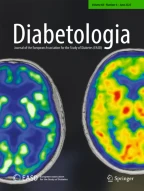1022Accesses
45Citations
3 Altmetric
Abstract
Aims/hypothesis. The aim of this study is to investigate whether apoptosis in human beta cells can be related to the induction of the tumor necrosis factor-related apoptosis-inducing ligand (TRAIL) pathway.
Methods. We examined the expression of TRAIL and TRAIL receptors in two human pancreatic beta-cell lines and in human primary islet cells using RT-PCR assays and flow cytometric analyses and tested TRAIL-mediated beta-cell destruction in51Cr release cytotoxicity assays, Annexin-V and APO-DIREC assays.
Results. Most of the human beta cells express TRAIL receptors-R1, -R2, -R3, -R4 and/or TRAIL. TRAIL induced much stronger cytotoxicity and apoptosis to beta-cell lines CM and HP62 than did FasL, TNF-α, LTα1β2, LTα2β1, LIGHT, and IFN-γ. The cytotoxicity and apoptosis induced by TRAIL to beta-cell lines CM were inhibited competitively by soluble TRAIL receptors, R1, R2, R3 or R4. Treatment of these beta cells with antibodies against TRAIL receptors was able to block the cytotoxicity of TRAIL to these cells. Beta-cell antigen-specific CTL (CD4+ and CD8+) clones express TRAIL, suggesting that these cells are potential sources of TRAIL-inducing beta-cell destruction. Normal primary islet cells from most donors are resistant to the cytotoxicity mediated by TRAIL. However, treatment with an inhibitor of protein synthesis (cycloheximide) or with an enzyme (PI-PLC) that can remove TRAIL-R3 from the islet-cell membrane was able to increase the susceptibility of TRAIL-resistant primary islet cells to the TRAIL death pathway.
Conclusion/interpretation. The TRAIL death pathway is present and can function in human islet beta cells, but unidentified inhibitors of the TRAIL death pathway are present in normal islet cells.
Article PDF
Similar content being viewed by others
Explore related subjects
Discover the latest articles, books and news in related subjects, suggested using machine learning.Avoid common mistakes on your manuscript.
Author information
Authors and Affiliations
Department of Pediatrics, Faculty of Medicine, The University of British Columbia, 950 West 28th Avenue, Vancouver, B.C. Canada, V5Z 4H4, , , , ,
D. Ou
Department of Pediatrics, University of British Columbia, British Columbia, Canada, , , , ,
D. Metzger, X. Wang, J. Huang & A. Tingle
Department of Diabetes, St. Bartholomew's Hospital, Royal London School of Medicine, London, UK, , , , ,
P. Pozzilli
- D. Ou
Search author on:PubMed Google Scholar
- D. Metzger
Search author on:PubMed Google Scholar
- X. Wang
Search author on:PubMed Google Scholar
- J. Huang
Search author on:PubMed Google Scholar
- P. Pozzilli
Search author on:PubMed Google Scholar
- A. Tingle
Search author on:PubMed Google Scholar
Additional information
Electronic Publication
Rights and permissions
About this article
Cite this article
Ou, .D., Metzger, .D., Wang, .X.et al. TNF-Related Apoptosis-Inducing Ligand Death Pathway-Mediated Human Beta-Cell Destruction.Diabetologia45, 1678–1688 (2002). https://doi.org/10.1007/s00125-002-0926-2
Received:
Revised:
Issue date:
Share this article
Anyone you share the following link with will be able to read this content:
Sorry, a shareable link is not currently available for this article.
Provided by the Springer Nature SharedIt content-sharing initiative



